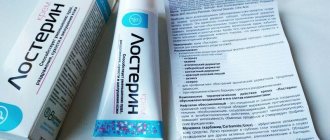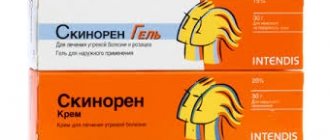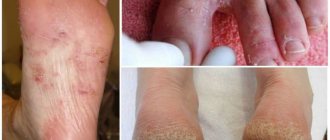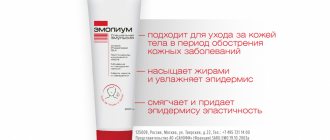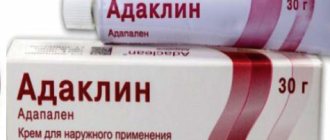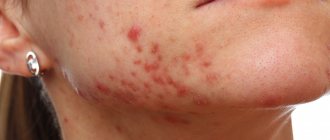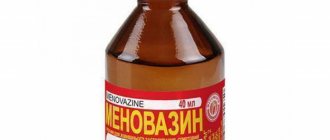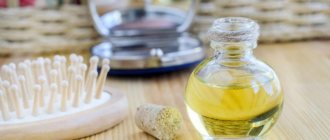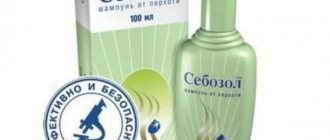What is the basis for the action of retina cream?
Penetrating into the structure of the skin, the gel induces the growth and rapid regeneration of epithelial cells, prevents the occurrence of inflammation, and most importantly, prevents acne from occurring and spreading. When applied topically, retin a cream helps straighten (even out) the skin surface and heal scars.
Stimulation of hair growth and antitumor effect is another area of practical application of this gel.
It should be understood that you cannot achieve an instant result from using retin cream, so you can expect a noticeable therapeutic effect only after 5-7 weeks of use. Maximum impact is observed after 9-13 weeks.
Compound
Tretinoin (transretinoic acid) is the active substance and is a crystalline powder with a distinct floral odor. The substance is highly soluble in dimethyl sulfoxide , difficult to dissolve in polyethylene glycol , octanol and 100% alcohol ( ethanol ), almost insoluble in water (solubility index at a temperature of 25 ° C is 0.126 mg/l), mineral oils and glycerin . The color of the powder can vary from yellow to light orange.
Release form
Tretinoin is available as:
- lotions with an active substance concentration of 0.05%;
gel with an active substance concentration of 0.025%, 0.05% or 0.1%;
pharmachologic effect
The substance Tretinoin belongs to the groups “Other antitumor drugs”, “Dermatotropic drugs”, as well as to the group “Vitamins and vitamin-like drugs”.
By affecting the body, it provokes:
- antitumor;
- keratolytic;
- antiseborrheic;
- comedolytic;
- immunostimulating;
- stimulating tissue regeneration;
- local anti-inflammatory effect.
Tretinoin is also used as a treatment for acne vulgaris and as a provitamin A.
Pharmacodynamics and pharmacokinetics
Tretinoin is classified as a systemic retinoid , which is an inducer of cellular differentiation. Its structure is similar to vitamin A and is a product of the metabolization of retinol .
The drug deservedly enjoys a reputation as an effective remedy for problem skin. Numerous positive reviews about Tretinoin cream indicate that if you follow all the recommendations listed in the instructions, acne and pimples disappear almost without a trace after two weeks of treatment.
Similar drugs to Tretinoin
Tretinoin is marketed on the Russian and Ukrainian markets in the form of generic drugs, which are:
- Vesanoid capsules , Hoffmann la Roche, Switzerland;
- cream and solution for external use Locacid , Pierre Fabre Medicament, France;
- cream and gel Retin-A (Retin-A) Janssen-Silag (Johnson & Johnson Corporation), India;
- cream Airol , Pierre Fabre Italia SpA, Italy.
Considering the number of positive reviews about the drug, many people facing the problem of acne ask questions “where to buy Tretinoin in Moscow?”
Main indications for the use of retin a cream
Prevention and treatment of acne and acne are the main indications for the use of retin a cream.
Also, most dermatologists and cosmetologists recommend this gel in the following cases:
- presence of pigment spots or wrinkles (medium or deep) on the face;
- prevention of new acne;
- cleansing/narrowing skin pores;
- improvement of skin structure and tone;
- giving the skin softness and elasticity.
To achieve tangible results (especially in terms of getting rid of wrinkles), you must use this product for at least 5 months.
Application and dosage of the drug
According to the instructions for using retin cream, it must be applied in a thin layer once a day. The areas of skin affected by the rash are smeared with gel before bedtime for a period of at least 6 hours. For patients with dry, fair or hypersensitive skin, it is recommended to limit the time interval to 30 minutes. After that, the remnants of the unabsorbed drug are washed off with ordinary running water. In case of urgent need, this procedure can be increased up to 2 times a day.
The duration of use of the drug largely depends on the form of the patient’s pathology. In the case of acne, the recommended time interval is 3-4 weeks; It will take 4 to 24 weeks to get rid of wrinkles or age spots.
For preventive purposes, it is allowed to use the cream no more than once a week.
It must be remembered that excessive dosage of the gel will not contribute to productive treatment, but will only aggravate the situation, causing irritation.
Before using the drug, it is strictly recommended to clean the surface of the skin with a special washing lotion, after which you should let it dry and “breathe” for 15-20 minutes.
TRETINOIN INSTRUCTIONS
It is advisable that the use of tretinoin cream be according to the instructions and agreed with a skin specialist. To get the best results from tretinoin cream, you must use it correctly. We recommend that you follow your skin specialist's instructions exactly, and you can also refer to the advice in this manual.
Tretinoin usage pattern
It is important to know! These instructions for tretinoin cream are for general information only. Tretinoin cream is a means of prolonged use. You need to be committed to disciplined work on your skin. Use this medication for the prescribed number of days, without interruption, even if it seems to you that it is not working.
The remedy works gradually, and it may take up to 6-8 weeks before you see improvement. Get ready to work patiently on your skin. Tretinoin has helped thousands of people around the world solve their acne problem, which means it will help you too. Be patient.
The first few weeks of using the drug may cause some deterioration or exacerbation of acne, pimples and skin rashes. Continue use - this is a normal skin reaction, you need to be patient. If the exacerbation becomes serious (this happens in rare cases of special skin sensitivity), you can stop using it for several days. As soon as the skin calms down, you can resume the course.
A full course of tretinoin lasts 12 weeks. In order to gradually accustom the skin to the drug, it is recommended to use it according to the following scheme:
— First week: every other day;
- Second week: two days we apply - one day rest - two days we apply - one day rest;
— Third week: every day;
— Fourth week: every day;
- Fifth week - every day (you can gradually introduce an increased concentration every other day)
- Sixth week - every day (if the skin reacts well, you can completely switch to a higher concentration), etc.
A noticeable effect occurs already after 3-4 weeks of use. After 10-12 weeks you will not recognize your skin, and this effect will remain with you for a long time.
Important: this scheme is only a general recommendation, you need to focus on your skin type, if you feel excessive discomfort - do not move to the next stage of the scheme or roll it back - this is the basic rule. You need to monitor your skin and its reaction and act accordingly. Before use, consultation with a dermatologist is recommended.
The stimulating effect of a course of exposure to tretinoin on the skin can last up to six months after stopping use of the product. Regular courses of tretinoin use have a very beneficial effect on skin health and prevent its aging. It renews the deep layers of the dermis and restores damaged collagen chains, essentially slowing down skin aging.
For very fair-skinned people, as well as people with extremely dry and sensitive skin, it is recommended to apply Tretinoin for no more than half an hour at the initial stages of the course of use. Then a gradual increase in the duration of skin contact with the drug is allowed. In this matter, it is better for you to get the recommendation of a skin specialist.
Choosing the optimal concentration of tretinoin cream?
The higher the concentration of tretinoin, the higher its effect, but the risks of irritation and side effects increase (temporary redness, inflammation, dryness, peeling of the skin). The best option is to gradually increase the concentration.
0.025% is the lowest concentration of tretionin available. It is recommended for use for very sensitive, delicate, thin, dry skin, or when using tretinoin for the first time in principle. If you are not confident in the adaptive abilities of your skin, it is better to choose this concentration.
0.04% or 0.05% is the most common concentration of tretionin. It is recommended for use for normal to oily skin that is not prone to allergies.
0.1% is the maximum possible concentration of tretinoin. Gives the most effective and intense results from use. Previous concentrations may be preparatory to this one. This type of tretinoin is best used for skin that is already accustomed to tretinoin. Therefore, it is recommended to start using this substance in your skin care with lower concentrations.
By following the recommendations for use, you can minimize skin irritation during the adaptation period. For example, you can start with a concentration of 0.025% (or 0.05% depending on the condition of the skin), and gradually move to a higher concentration during the course, using it more often, starting from several times a week.
How quickly are the effects of using tretinoin noticeable?
The first 1-3 weeks (it varies from person to person) the process of skin adaptation is observed - visible deterioration of the condition, irritation, redness and peeling. A noticeable effect and improvement is usually noticeable within 3-4 weeks of use. Further improvements appear gradually and incrementally. A lasting, pronounced effect is usually achieved 8 to 10 weeks after the start of the course. By this time, positive irreversible changes are detected in the dermal matrix of the skin, restoring normal skin function.
How to apply tretinoin cream according to the instructions?
- It is advisable to store the drug in the refrigerator.
- Wash your hands before and after using tretinoin.
- Apply only once a day at night, before going to bed (IMPORTANT! in light, the drug loses most of its beneficial properties, retinol is destroyed in the light).
- Before applying, you need to wash your face with the mildest, children's pharmaceutical product, without any fragrances or effects. Preferably with a PH level of 5.5 (This product is sold in our Jovees store) / Put your usual washes aside during the course of Tretinoin - they can dry out the skin!
- After washing, pat your face with a towel, then it is very important to wait at least 5 minutes until the moisture from the skin evaporates and so that the skin has time to restore its protective fat barrier - this will greatly reduce the risk of side effects. After 5-10 minutes, you can apply tretinoin and go to bed. (IMPORTANT! Water prevents tretinoin from penetrating the skin; if applied to a freshly washed face, the effect of the product will be greatly reduced).
- The cream can be applied both to the entire face and locally to areas requiring treatment.
- To avoid side effects, it is not recommended to use any other cream on top of tretinoin and thereby mix the chemicals of different drugs in the skin, since Tretinoin cream itself is a very powerful product and has a total effect on the skin.
- You should apply a small amount (about the size of a large pea) of cream - too much cream will not add any effect, but will increase the likelihood of adverse reactions. More doesn't mean better. What is more important here is the regularity and duration of use. The cream is rubbed in with light movements. At the same time, it should immediately become invisible or, at a minimum, unnoticeable. If the cream peels off after it dries or is too noticeable on the skin, this is evidence that the dosage has been exceeded!
- Can be applied to the face, neck, décolleté, hands, etc. Avoid contact with mucous membranes, skin around the nostrils, and corners of the lips. Strictly do not apply to the skin of the lips and around the eyes!
- In the morning after waking up, wash your face with a mild, non-drying product and be sure to apply a nourishing face cream with at least SPF20 sun protection (very desirable, since even in winter the sun’s activity can be high).
- If the skin is very dry, then during the day you need to moisturize the skin with a neutral nourishing cream (such as Nivea, baby or Lipisz cream) and a spray with thermal water.
What should you absolutely avoid?
- Avoid the sun and tanning! During the course of treatment, be sure to use a cream with an SPF filter of at least 20 units (even in winter, if the sun goes out for several hours)! Strictly do not visit the solarium and do not sunbathe in the sun, do not use it before traveling to hot countries - otherwise severe allergies and skin pigmentation may begin!
- Avoid exposure to excessive wind or frost. The skin under the influence of tretinoin becomes very sensitive to any influence, and this can cause severe irritation.
- Masks, peelings, tonics, products with acids, any other medicinal products - nothing additional can be used during the entire period of treatment with Tretinoin, otherwise the skin can be overloaded and provoke a severe allergic reaction.
- Avoid frequent washing, scrubbing or rubbing the skin. Remember, acne and pimples are not caused by dirt. Excessively frequent and harsh cleansing/scrubbing of the skin can aggravate acne and pimples.
- The drug should absolutely not be used during pregnancy, and at the time of preparation for conception (3 months before) or lactation.
- Tretinoin should never be mixed with the following drugs:
- benzoyl peroxide,
- sulfur,
- salicylic, alpha-hydroxy acids and other types of acids,
- any abrasive agents, as well as drying or astringent skin products with essential oil extracts, alcohol, fragrances, soap, lauryl sulfate, etc.
These products may cause severe skin irritation if used in conjunction with tretinoin.
- Avoid getting tretinoin in your eyes or any mucous membranes—your mouth, nose, or lips. If it gets into any of these areas, rinse immediately with plenty of water.
- If you miss one or more days of use, under no circumstances should you use a double dose of tretinoin the next day! A larger amount of the drug will not speed up healing, but will only lead to unwanted side effects.
- It is strictly forbidden to use tretinoin on tanned, very dry, inflamed skin. Do not apply to open wounds, incl. acne wounds, ulcers and any other skin damage.
Side effects and skin adaptation phase
- If you do not violate the instructions for using tretinoin, then in the first 1-3 weeks (individually) of using tretinoin cream, your skin will go through an adaptation phase to the retinoid. The adaptation phase is expressed to varying degrees in everyone, depending on the individual characteristics of the skin. This phase is a process of getting used to the drug and is characterized by such phenomena as:
- redness, skin irritation,
- exacerbation of acne and inflammation,
- the effect of tightness, dryness, thinning,
- active peeling.
- Do not worry! This is a normal phase of the drug’s action and must be experienced. Do not interrupt the course of treatment! Over time, the skin develops tolerance to retinoic acid and the irritation effect gradually decreases and disappears - tretinoin normalizes the level of moisture in your skin.
- To reduce the severity of side effects, it is recommended to strictly follow the instructions for use and the recommendations of your dermatologist. If side effects become excessive, consult your doctor.
- It is recommended that you schedule your first use of tretinoin over the weekend to test how your skin reacts.
In what cases should use be discontinued?
If there is no severe allergic reaction, it is not recommended to interrupt the course, otherwise the effect of adaptation to tretinoin will be lost. This means that stopping use will likely result in you experiencing peeling, redness, and other side effects again.
If you miss one or more days, you should never use a double dose of tretinoin the next day!
Stop using the drug and get medical help if you have any of these signs of an allergic reaction to tretinoin: difficulty breathing, swelling of your face, lips, tongue, or throat, severe rash, chest tightness, severe burning or irritation of the treated skin, severe redness, blistering, or crusting at the application site. In most cases, these allergic reactions disappear after discontinuation of the drug. This is not a complete list of all side effects that may occur.
According to statistics, contact allergies to topical tretinoin are quite rare. If you have questions about side effects, consult your dermatologist.
How often to use tretinoin after the end of the course?
At the end of the course, when your skin has become accustomed to it and no longer flakes, does not redden or dry out and looks healthier, you can switch to the maintenance program. Reducing the use of the drug to 2-3 times a week allows you to maintain the achieved effect.
Contraindications
Tretinoin should not be used during pregnancy and breastfeeding, and it is also undesirable to become pregnant within 3-4 months after completing the course of using the drug (drugs of the retinoid group have a teratogenic effect on the fetus, causing serious disorders of embryonic development)! For more detailed advice, consult a dermatologist.
=============================================================================
Based on materials from the instructions for tretinoin, as well as from various sources, including those translated from English.
This tretinoin instruction does not replace consultation with a specialist.
